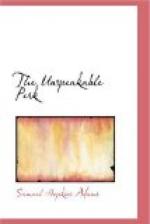P. F. F. C.
XII
THE WOMAN AT THE QUINTA
Thanks to his rival’s map, Carroll had little difficulty in finding the trail to the mountain quinta. A brilliant new moon helped to make easy the ascent. What course he would pursue upon his arrival he had not clearly defined to himself. That would depend largely upon the attitude of the man he was seeking. The flame of battle, still hot from the afternoon’s melee, burned high in the Southerner’s soul, for he was not of those whose spirit rapidly cools. Bitter resentment on behalf of Miss Polly Brewster fanned that flame. On one point he was determined: neither he nor the so-called Perkins should leave the mountain until he had had from the latter’s own lips a full explanation.
Coming out into the open space, he got his first glimpse of the quinta. It was dark, except for one low light. From the farther side there came faintly to his ear a rhythmical sound, with brief intervals of quiet, as if some one hard at labor were stopping from time to time for breath. At that distance, Carroll could not interpret the sound, but some unidentified quality of it struck chill upon his fancy. Long experience in the woods had made him a good trailsman. He proceeded cautiously until he reached the edge of the clearing.
The sound had stopped now, but he thought he could hear heavy breathing from beyond the house. As he moved toward that side, a small but malevolent-looking snake slithered out from beneath a bush near by. Involuntarily he leaped aside. As he landed, a round pebble slipped under his foot. He flung up his arm. It met the low branch of a tree, and saved him a fall. But the thrashing of the leaves made a startling noise in the moonlit stillness. The snake went on about its business.
“Hola!” challenged a voice around the angle of the house.
Carroll recognized the voice. He stepped out of the shadows and strode across the open space. At the corner of the house he met the muzzle of a revolver pointing straight at the pit of his stomach. Back of it were the steady and now goggleless eyes of Luther Pruyn.
“I am unarmed,” said Carroll.
“Ah, it’s you!” said the other. He lowered his weapon, carefully whirled the cylinder to bring the hammer opposite an empty chamber, and dropped it in his pocket. “What do you want?”
“An explanation.”
“Quite so,” said the other coolly. “I’d forgotten that I invited you here. How long had you been watching me?”
“I saw you only when you came out from behind the house.”
“And you wish to know about—about my companion in this place?” continued the other in an odd tone.
“Yes.”
“Understand that I don’t admit that you have the smallest right. But to clear up a situation which no longer exists, I’m ready to satisfy you. Come in.”




